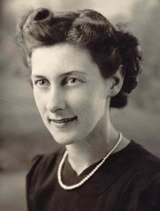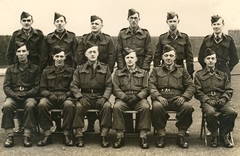

East Boldon Home Guard - Doreen Remembers
| "East Boldon was a small village a couple of miles north of Seaburn, there was a colliery and all the local recruits were miners, they were tough, short, stocky men, devoted and truly loyal to their colliery. Tom was soon given ‘one pip’ and became Lieutenant and had his own platoon. Men turned up as and when their work allowed. Comradeship was a way of life with them, humour replaced genteel manners and the many humorous situations plus a few swear words kept the atmosphere going. On exercises one Sunday morning Tom nearly lost an ear. One of his men swung round quickly, with bayonet fixed, and Tom escaped with a small cut on the back of his ear. They had a medic, an old boy, but he was so grubby himself they all swore they wouldn’t want him near them. Even so, they were fighters and ammunition was coming through now. We kept 6 hand grenades and Tom’s rifle under the stairs in a cupboard; I was shown how to use them just in case." |  |
 | Officers of the East Boldon Home Guard. Tom Parratt back row, second from right. |
| Swan Hunters - Dorothy Remembers | |
|---|---|
| Dorothy A Nicholson British civilian worked as inspector in shell shop and in charge of Deliveries Dept and Control Dept at Swan Hunter shipyard, Tyneside, GB, 1916-1954 This is reel 1 of an oral history by Dorothy herself recorded by the imperial war museum. | |
| Source: Copyright IWM | Complete interview |
|
A whole year before the war started, we suspected that it was coming. I was 27 years old and was living in the same house that I am in now, in East Boldon. The morning that war actually broke out was a Sunday. We were all at church because we were nervous and upset. It was a lovely Sunday morning in September. One of the elder members of the congregation went out to somebody's house and he came back to tell us: “I'm very sorry to bring the news that we are at war with Germany”. We all started to cry, because we did not want to be at war with Germany, because a lot of our people had married Germans, and the German members of our church were very good people. No-one wanted it. Just then the sirens went. It was merely a flock of birds flying over, but the people in charge of the sirens thought that it was planes already on their way from Germany. You did not know what to do. I came back to this house to my mother who was cooking the dinner, and my husband Norman was out at the first-aid office, where the first news was coming through. A lot of people were trained so that they would be able to look after people who would have broken limbs etc. After that they were put on rotas, so people would be there all the time. Norman came back that night and said “Don't bother with dinner for me”, he was too upset. We knew that there would be rationing, so I had been saving up food in my large floor-to-ceiling cupboard. It was a good thing, because food immediately went right off the shelves in all the shops. But there was nothing like starvation at all — there was always sufficient food. My husband was a builder, but they no longer needed people to build houses after war had broken out. So he was sent to an island north of Scotland, in the Atlantic, because that is where all the war-ships coming from Germany would land. He was there for three years. He was never really in the army: he was a builder, and he was sent to different places to build camps for the soldiers. The pay was just the same as it was for being in the army, but he was never actually in uniform. (29 Ferndale avenue east Boldon) Behind my house there is a field where soldiers were billeted. Since there was only my mother and I in this house, I had to take soldiers in, because there were too many of them to all be lodged in the camps. I had to take strange men in for three years: as one lot went out, another lot came in, as I had my name down for providing lodgings. It was because my mother was half-blind so I had to stay at home to look after her. I would be making myself breakfast and someone, perhaps a friend from across the road, would knock on my door and say “You're going to get some more”. One time I got an officer, Mr Brown, who would sleep in the front bedroom and come downstairs for his meals. He had a “batman” - another younger soldier there to look after him — called Jack. Jack used to have to take all of Mr Brown's washing to the launderette. One day he came to me and said: “I've done a terrible thing. I have been on the guns” - he had not really - “when I was supposed to be taking Mr Brown's clothes to Sunderland to the launderette. Do you think it's possible that you could do it for me?” So I did the washing. Mr Brown would give him money to go into town to collect it, and he just kept the money, while I did the washing. He started to do this quite often. I had an awful time of it, because Mr Brown had decided that he would rather have his tea downstairs with me and my mother than alone in his room. Of course his shirts were hanging up on the line in the back garden, so I had to whip them down and hide them while he had his food. Eventually he came to know what Jack was doing, and he fired him. The batmen I took in used to have their friends over, at night when it was raining and they had nowhere to go besides their barracks. They used to knock on the back door and I let them in. They used to sit and talk and laugh in the kitchen. They were all very grateful that I had a fire, and they used to come in and huddle around it. I used to make them coffee: they would bring dried milk and things like that, and I would make them what they brought. Sometimes, if I had a bit of rations I would have a bit of cake for them, or a biscuit. I used to knit socks everlastingly for them. I was friends with many of them for years after the war. The barracks were very close to our neighbourhood, and one night they were bombed and all the glass was blown out of the window in my lounge. We had air-raid shelters, called “Anderson shelters”, which were made out of corrugated iron. It was dug deep into the ground, so it always filled up with water and everyday I had to go and get buckets and buckets of water to bale it out. We had an attache-case in which we kept all our important documents — insurancy policies and deeds and all that — and whenever the sirens went off and we had to go into the shelter we took the case with us. There was a dog, Scamp, next door who used to know when the air-raids were coming as it would feel the tremor of the planes. His mother used to come to tell us, “You had better get inside the shelter because Scamp says they're coming”. We would be in there for a couple of hours at a time, and it was cold and wet, and we were glad when we could come in and get back into bed. It was not as hard a time as some people had, but it was hard. I remember the day the war ended very well. Word came through on the wireless that Germany had given up. We all went to church to say thank God. Every street had tables out with a tea, and all the people came out. We all pooled in what we could get together. But it was a long time after that war finished that we got off rationing. It might have even been as long as ten years that certain things were rationed |
|
People in story: Olive May Location of story: East Boldon, Tyne & Wear Background to story: Civilian Article ID: A5237372 Contributed on:21 August 2005 http://www.bbc.co.uk/history/ww2peopleswar/stories/72/a5237372.shtml 'WW2 People's War is an online archive of wartime memories contributed by members of the public and gathered by the BBC. The archive can be found at bbc.co.uk/ww2peopleswar' |